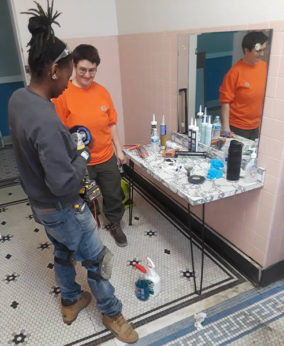
CHICAGO—When people hear about the “labor movement,” they think “unions.” While that is certainly true, the St. Louis Workers’ Education Society is coming to a major labor gathering here this weekend hosted by a group that is, like the WES itself, a non-union labor organization.
More than 2,500 grassroots labor activists, “worker center” leaders, union members, union officers, and community activists will gather at the Labor Notes 2018 Conference at the O’Hare Airport Hyatt where they hope to spread what they say is their “fighting spirit.”
There will be some 200 meetings running from Friday, April 6 through Sunday, April 8, including sessions devoted to creative organizing tactics, beating apathy, running for local union office, winning contract campaigns, bargaining over technology, understanding the economy, and life after “right to work.”
Tony Pecinovsky, the president of the St. Louis Workers’ Education Society and his colleague Al Neal, a lead organizer for the group, have been invited to speak on a panel at the Labor Notes gathering. They got the invitation, Pecinovsky says, because of the unique type of organization they are.
Pecinovsky started out in the Spring of 2014 in an attempt to fill a huge gap in St. Louis—the gap between the large numbers of African Americans seeking jobs on which they could earn a decent living and the number of those jobs available. So a small band of community activists reached out to retired and active members of the skilled trades unions, including the Operating Engineers, the Painters, and others to begin addressing the problem.
The unions came in and together with the community activists they put together an apprenticeship training operation, reaching out to the members of the community who could benefit from the training.
At least 80 members of the community who signed up for training provided by the Painters have since become skilled apprentices making a union wage. “In some parts of the country, the skilled trades aren’t known for being the most proactive in reaching out to minorities,” said Pecinovsky, “but here in St. Louis that is not the case, and we have succeeded in building a relationship between community and labor unions.”

“We focus on worker education,” not on challenging companies directly or on litigating directly, Pecinovsky said. He gave as an example his group’s recent campaign to teach people about the dangers of so called right to work legislation passed in Missouri. The proposed law is currently sidelined after a successful citizen campaign pushed the measure onto the ballot to be decided by the people directly. “The AFL-CIO in this state presented signatures from 375,000 people to accomplish this,” he said.
Pecinovsky differentiates between more traditional workers’ centers and his organization. “They do organizing for day laborers or immigrants, for example, where some of the main line unions do not,” he explained. “Our work is educational in nature but just as necessary.” He said he hopes to bring that message to the Labor Notes conference this weekend.
“On the other hand, we have plenty to learn from them,” he said. “It is always good to hear the experiences of other folks in this very big, very broad labor movement we have in this country.”
Others going to the conference are expressing similar excitement and eagerness to learn. “We organized our union at Lipton Tea a year ago and just won our first contract,” said Anita Anderson, a member of the United Food and Commercial Workers Union, Local 400 in Suffolk, Va. Anderson, a first-time attendee at Labor Notes, said, “It’s a place where people like me can learn, I hope, to make our unions stronger.”
“Seeing us all together at the last Labor Notes conference rallying for the same cause made me realize that this is a fight worth staying in,” said Gloria Martinez with United Teachers in Los Angeles. “I was especially moved when I got to hear the leaders of the Detroit blueberry workers fight, since I’d been telling my students about the boycott. Being part of all that solidified my decision to step up and take up more leadership in my own union.”










